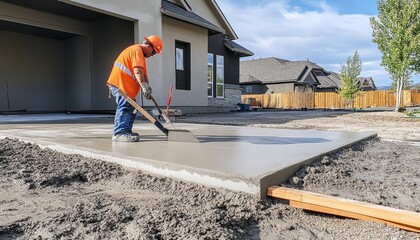Concrete contractors play a pivotal role in the construction industry, ensuring that structures are built with precision and durability. Their work extends beyond simple pouring of concrete, involving expertise in various stages of construction.
The demand for concrete in modern projects has led to continuous innovations and improvements. These contractors must adapt to evolving technologies and techniques to meet the needs of today’s construction world. Contact Nashville Concrete Contractors for professional help.
One of the main aspects of a concrete contractor’s job is ensuring that the foundation of a structure is solid. A stable and level foundation is essential for the integrity of the entire building. Concrete contractors understand the science behind soil testing and foundation design. They also take into account local climate conditions to guarantee the foundation’s durability.
The versatility of concrete is one of its strongest attributes, and contractors are skilled in utilizing this material for different applications. From driveways to sidewalks, patios to industrial floors, concrete can be shaped into virtually any form. Contractors often use various mixing techniques and additives to create the perfect balance of strength and flexibility. This adaptability makes concrete a favored material in the construction of both residential and commercial structures.
Formwork is another critical element that concrete contractors deal with. It involves creating molds to shape the concrete before it sets. This process requires precision, as improperly constructed formwork can lead to defects in the final structure. The right formwork ensures that the concrete flows and hardens in the desired shape, leading to an even, smooth surface.
Once the formwork is set, concrete contractors must pay close attention to the curing process. Concrete’s strength relies heavily on how it is cured after being poured. Contractors use a variety of methods to ensure that concrete cures properly, such as keeping it moist and controlling the temperature. Inadequate curing can lead to cracking or reduced strength, compromising the safety and longevity of the structure.
In addition to structural work, concrete contractors often deal with decorative concrete applications. Decorative concrete has become increasingly popular in residential and commercial spaces due to its aesthetic appeal and affordability. Techniques like stamping, staining, and polishing allow concrete to mimic the appearance of more expensive materials such as stone or wood. Contractors skilled in decorative concrete are able to transform ordinary surfaces into stunning focal points.
One of the most challenging aspects of concrete contracting is dealing with environmental factors that affect the concrete mix. Temperature, humidity, and even wind can impact the curing process and the final outcome. For example, pouring concrete in extremely hot or cold weather requires special additives to prevent rapid drying or freezing. Concrete contractors must plan carefully to ensure that environmental conditions do not affect the quality of the work.
The construction of concrete slabs for floors, driveways, and foundations is a key responsibility of concrete contractors. Slabs need to be perfectly level and adequately supported to prevent cracking or settling. Contractors must consider factors like load-bearing capacity and expansion when designing and pouring slabs. Proper preparation of the subgrade and correct placement of reinforcement are critical steps in the process.
Concrete contractors also have to stay up to date with new regulations and standards in the industry. Building codes related to concrete construction evolve over time to reflect advancements in materials and techniques. Contractors must be well-versed in local building codes and industry standards to ensure compliance with safety and quality requirements. This knowledge helps protect both the contractors and the property owners from legal and financial risks.
Concrete repair and restoration is another significant part of a contractor’s job. Over time, concrete structures can develop cracks, leaks, or other forms of damage. Contractors have the expertise to assess the extent of the damage and recommend appropriate repair methods. Whether it’s resurfacing a driveway or restoring a crumbling foundation, concrete contractors have the tools and knowledge to restore damaged concrete to its original strength.
Concrete contractors also focus on improving the sustainability of their projects. With the growing demand for eco-friendly construction, many contractors are adopting green building practices. This can include using recycled concrete, reducing waste, and minimizing energy consumption during the mixing and curing processes. Sustainable concrete methods are becoming a priority for contractors aiming to reduce the environmental impact of their work.
Another area where concrete contractors excel is in the preparation of concrete for heavy-duty applications. Industrial floors, for instance, require special attention to ensure they can withstand the weight of machinery, equipment, and foot traffic. Contractors use specialized equipment and techniques to reinforce these floors, ensuring they are resistant to cracking, wear, and chemical exposure. Concrete contractors also work with other professionals to create floors with anti-slip surfaces or high-strength compositions.
Concrete contractors are also tasked with ensuring the proper drainage of concrete surfaces. Proper drainage is vital to prevent water accumulation, which can weaken the concrete and lead to erosion. Contractors incorporate slopes and drainage systems into their designs to channel water away from concrete surfaces. This proactive approach helps to extend the lifespan of concrete installations, especially in areas with frequent rainfall or snow.
As concrete technology advances, so does the role of the contractor. New additives, such as self-healing concrete, are changing the way concrete repairs are approached. These innovative materials can detect and repair minor cracks on their own, reducing the need for extensive repairs. Contractors are exploring how these new technologies can be incorporated into their projects to improve both the functionality and longevity of concrete structures.
The skill set of a concrete contractor goes beyond just mixing and pouring. Attention to detail, problem-solving, and a thorough understanding of materials science are all crucial to success in this field. Contractors must also have good project management skills to oversee teams, schedule tasks, and ensure that work is completed on time and within budget. Their ability to communicate effectively with clients, architects, and other tradespeople ensures that the final product meets everyone’s expectations.
Concrete contractors also play an integral role in the restoration of historical and cultural buildings. Preserving the integrity of these structures often requires specialized knowledge and techniques. Contractors must carefully match new concrete work with the existing material to maintain the aesthetic and historical value of the building. This work requires both technical expertise and a deep respect for the craftsmanship involved in the original construction.
Safety is a top priority for concrete contractors, as working with heavy materials and machinery presents inherent risks. Contractors must ensure that their teams are properly trained and equipped with safety gear. This includes everything from securing formwork to ensuring that all equipment is in good working condition. Strict adherence to safety protocols reduces the likelihood of accidents and ensures that the job is done efficiently and without harm.
The ability to work in a wide range of environments is another characteristic of successful concrete contractors. From residential homes to large-scale commercial projects, contractors must be adaptable. Each job presents its own set of challenges, from working in tight spaces to dealing with adverse weather conditions. The versatility of concrete contractors allows them to tackle these challenges with confidence and skill.
In conclusion, concrete contractors are a vital component of the construction industry. Their expertise in pouring, finishing, and repairing concrete ensures that buildings and infrastructure remain strong, secure, and durable. As the industry continues to evolve with new technologies and sustainability practices, the role of concrete contractors will only become more critical. The value they provide goes beyond just laying concrete; they are essential in shaping the built environment for years to come.


